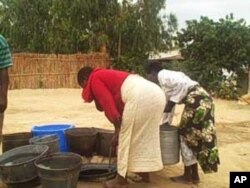Kiosks have long been the only source of safe drinking water for over half of Malawi’s urban population living in unplanned areas. But the occasional failure to pay water bills has led authorities to close them in most areas.
In the Central Constituency of Malawi’s commercial capital, Blantyre, 18 kiosks out of 29 were disconnected over the past four years, forcing residents to get water from unprotected sources like wells and rivers.
The people hurt most by water shortage are the poor, old and vulnerable.
“The closure of water kiosks has brought us a lot of problems. For example, we are collecting water from dug wells and rivers in the process, risking our lives to waterborne diseases. Water taps are not very common here,” says One Annie Thomson, who lives in Ndirande Township in Blantyre.
The city assembly, the Water Board and a private aid group called Water for People are working to reopen the taps in Blantyre’s four townships.
Meanwhile, city officials have named Project Management Committees to explain the new plan to township water users.
Chaplain Mussa a member of the committee in Ndirande Township, says the planners want to teach financial management skills to help communities keep the kiosks open.
He says a designated kiosk unit, headed by a manager, will co-ordinate billing using a transparent pricing system and will deal directly with the communities on the method of payment, the increase and fees and other issues.
“There can be no misappropriation of funds because there will be a bank account where kiosk managers will deposit the [payments]. The money will be used for paying water bills and salaries for kiosk management staff,” explains Mussa.
He says part of the money will be used to repay past bills.
Mussa says plans are also underway to elect board members of a Water Users Association. They will monitor the operations of kiosks management staff, ensuring transparency.
The residents have welcomed the new plan but express hope it will be free from political interference, which they say contributed to the closure of some water kiosks in the past.
The Blantyre City, authorities say similar initiatives have proven successful in Uganda, Kenya and Tanzania.






